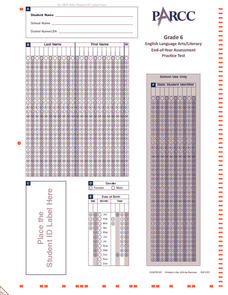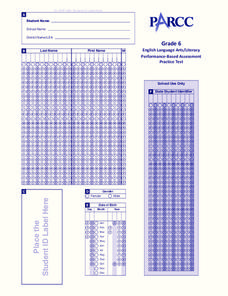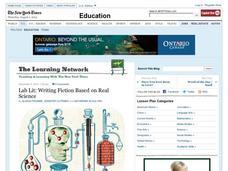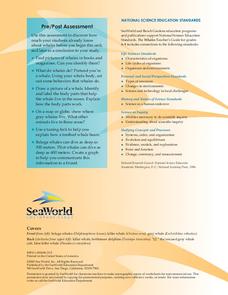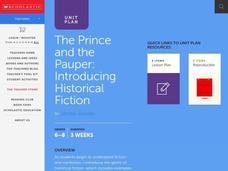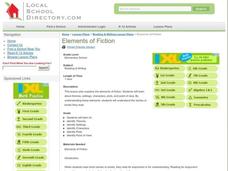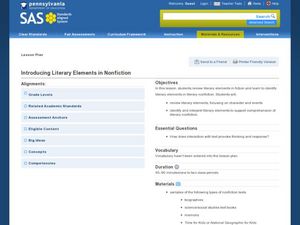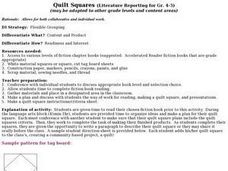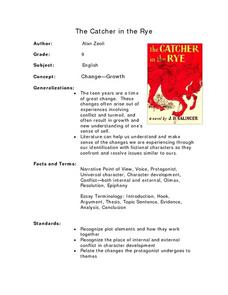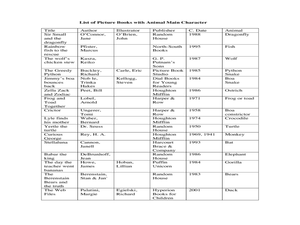Curated OER
End-of-Year Practice Test (Grade 6 ELA/Literacy)
With the end of the year quickly approaching it's time to find out exactly how much your sixth graders have learned. Specifically designed for the Common Core ELA standards, this practice test gives students five reading passages,...
Curated OER
Performance-Based Assessment Practice Test (Grade 6 ELA/Literacy)
Keep an eye on the growth of your sixth graders' reading and writing skills with the help of this practice Common Core assessment. Working their way through the six included fiction and nonfiction reading passages, learners answer a...
Curated OER
Rachel's Life is in a Hole
Explore how lack of access to water impacts peoples' lives in poor countries. Through text reading and discussion, middle schoolers are presented with the story of a young girl who lives and functions with limited water resources. They...
The New York Times
Writing Fiction Based on Real Science - NYTimes.com
Refuse to alienate your scientific-minded young scholars during your creative writing unit. Learners explore how literary writing can reflect observable fact, and be based in actual science. The links include examples of fiction and...
Penguin Books
A Teacher's Guide to the Signet Classics Edition of H.G. Wells's The Time Machine
Imagine being able to travel back and forth in time! H.G. Wells uses that scenario in his novel The Time Machine to comment on what he saw as the flaws in Victorian society and the industrial age. This teacher's guide is one of the best...
Curated OER
Identifying Science Fiction
Pupils discuss works of science fiction that they read, highlight aspects that made each a part of science fiction genre, identify formal literary elements, and discuss ways each can be developed through science fiction.
Curated OER
Against the Odds
What factors help people achieve goals? What factors prevent people from achieving goals? What are the elements that need to be in place to make a team function well? Using Damien Lewis’ Desert Claw and John Francome’s Winner Takes All,...
Sea World
Whales
A whale of a lesson is sure to intrigue your elementary oceanographers! Learn about the mammals of the sea with a series of activities about whales, dolphins, and porpoises. Kids complete worksheets about the anatomy of a whale, create a...
Curated OER
Wrapped in Mystery
Sixth graders can identify five basic elements that most mysteries contain. They put the elements of mystery into a graphic organizer they can follow. They construct meaning after reading Poe's short story and identify or infer the...
Curated OER
The Prince and the Pauper
Mark Twain, the famous American author, is often studied in the school system. Use "The Prince and the Pauper" to analyze the differences between the text and its video version. This lesson includes several culminating project ideas for...
Curated OER
Performance-Based Assessment Practice Test (Grade 4 ELA/Literacy)
Track the progress of your fourth graders' reading and writing skills with this practice Common Core assessment. Based on a collection of six reading passages that include narrative stories, poetry, and a series of informational...
Curated OER
Elements of Fiction
Students identify key story elements in a fiction text. In this literacy lesson, students are introduced to the various elements of fiction such as the setting, plot, and theme. Students read a short story of their choice and identify...
Curated OER
Reviewing Literary Elements
Students identify the elements of fiction, and work on compare and contrast skills.. In this comprehension instructional activity, students read different versions of Cinderella. Students use a Venn diagram to compare and contrast the...
Curated OER
Introducing Literacy Elements in Nonfiction
Explore nonfiction writing with your class. They will identify elements in nonfiction by reviewing elements of fiction. Then they use biographies, memoirs, menus, Time for Kids, and text books to identify elements of nonfiction. They...
Curated OER
Kumeyaay Indians
Useful for literary analysis, citing textual evidence, or summary skills, this lesson about the Kumeyaay Indians would be a good addition to your language arts class. Middle schoolers read novels and summarize the literature in their own...
Curated OER
Quilt Squares-Literature Reporting
Differentiate instruction with this crafty approach to demonstrating comprehension. Learners choose a fictional book at their reading level, and afterward create a quilt square. The square is "decorated" with words, illustrations, and...
DeKalb County Schools
Compare/Contrast
A series of reading activities is sure to engage your young readers! Based on comparing and contrasting ideas, the packet provides opportunities to compare characters, themes, texts, and other elements of fiction.
Curated OER
Science Fiction
Learners write a science fiction story. In this science fiction lesson, students read selections of science fiction and compare them to supernatural stories from the Bible. Learners identify themes and discuss elements that are common...
Curated OER
The Catcher in the Rye
Ninth graders engage in the reading of literature in order to focus upon some of the basic literary elements while examining "The Catcher In The Rye". They use the experience of reading and literary analysis in order to help develop an...
National Endowment for the Humanities
Folklore in Zora Neale Hurston's Their Eyes Were Watching God
Learners define folklore, folk groups, tradition, and oral narrative. They identify traditional elements in Their Eyes Were Watching God Analyze and understand the role of traditional folkways and folk speech in the overall literary...
PBS
Reading Adventure Pack: Farms
A Reading Adventure Pack features a fiction and nonfiction text—The Oxcart Man by Donald Hall and illustrated by Barbara Cooney and Farming by Gail Gibbons. Following the readings, scholars make a collage showcasing foods farmed from...
PBS
Reading Adventure Pack: Oceans
Flotsam by David Wiesner and The Magic School Bus on the Ocean Floor by Joanna Cole, illustrated by Bruce Degen, begin a reading adventure pack focusing on oceans. With story listening and thoughtful discussion, scholars complete several...
Curated OER
Lots of Lessons from Aesop
Aesop’s Fables offer young learners an opportunity to study figurative language. After reviewing theme, simile, alliteration, and metaphor, model for your pupils how to identify examples of these devices in the fable. Class members then...
Curated OER
Find an Animal! Find a Book!
Young scholars identify the themes of different books by classifying their genre. In this genre lesson, students examine a specific animal by reading both a nonfiction and fiction book about the species. Young scholars compare the...


